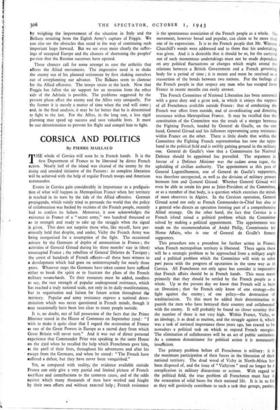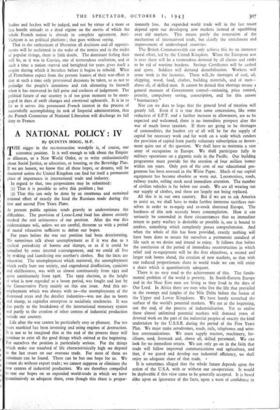CORSICA AND POLITICS
By PIERRE MA1LLAUD
commandos.
Events in Corsica gain considerably in importance as a prefigura- tion of what will happen in Metropolitan France when her territory is reached in its turn by the tide of the Allied offensive. German propaganda, which vainly tried to persuade the world that the policy of collaboration was backed by sections of the French people, recently had to confess its failure. Moreover, it now acknowledges the existence in France of a "secret army," two hundred thousand or so in strength and ready to take up the struggle when the signal is given. This does not surprise those who, like myself, have per- sistently held that despite, and under, Vichy the French Army was being reorganised for a resumption of the fight. The occasional seizure by the Germans of depots of ammunition in France ; the activities of General Giraud during his three months' stay in (then) unoccupied France ; the rebellion of General Delattre de Tassigny ; the arrest of hundreds of French officers—all these bore witness to a development which had gone on uninterruptedly for nearly three years. Whatever steps the Germans have taken cannot have sufficed either to break the spirit or to frustrate the plans of the French military revanchards. To their resources must be added, needless to say, the vast strength of popular underground resistance, which has reached a truly national scale, not only in its daily manifestations, but in organisation and liaison for future action throughout flag territory. Popular and army resistance express a national deter- mination which was never questioned in French minds, though it may occasionally have been less clear to many people outside.
It is, no doubt, out of full possession of the facts that the Prime Minister stated in the House of Commons on September 22nd: "I wish to make it quite clear that I regard the restoration of France as one of the Great Powers in Europe as a sacred duty from which Great Britain will never turn." And it was out of direct personal experience that Commander Prior was speaking to the same House on the 23rd when he recalled the help which Frenchmen gave him, at the peril of their lives, throughout his adventures and after his escape from the Germans, and when he stated: "The French have suffered a defeat, but they have never been vanquished."
Yet, as compared with reality/ the evidence available outside France can only give a very partial and limited picture of French sacrifices and contributions to the common cause, and of the odds against which many thousands of men have worked and fought by their own efforts and without external help ; French resistance
is the spontaneous association of the French people as a whole. No movement, however broad and popular, can claim to be more than one of its expressions. It is to the French people that Mr. Winston Churchill's words were addressed and to them that his undertaking was given. And it is des. irable that it should be so, for the carrying out of such momentous undertakings must not be made dependent on any political fluctuations or changes which might attend the relations between a British Government and a French governing body for a period of time ; it is meant and must be received as a reassertion of the bonds between two nations. For the feelings of the French people in that respect any man who has escaped from France in recent months can easily answer.
The French Committee of National Liberation has been entrusted with a great duty and a great task, in which it enjoys the support of all Frenchmen available outside France: that of conducting the French war effort from outside, and of co-ordinating and directing resistance within Metropolitan France. It may be recalled that the constitution of the Committee was the result of a merger between the Fighting French, headed by General de Gaulle, on the one hand, General Giraud and his followers representing army resistance within France on the other. There is little doubt that within the Committee the Fighting French representation has now the upper hand in the political field and is swiftly gaining ground in the military one. General de Gaulle's view that a Commissaire for National Defence should be appointed has prevailed. The argument in favour of a Defence Minister was the cedant arma togae, the upholding of civilian authority. The appointment at this post of General Legentilhomme, one of General de Gaulle's supporters, was therefore unexpected, as well as the division of military powers between him and General Giraud. Whether General Giraud will even be able to retain his post as Joint-President of the Committee, or as a member of that body, is a question which exercises the minds of most observers in Algiers. In the Corsican operation, General Giraud acted not only as French Commander-in-Chief but also as a general who directs an operation forming part of a comprehensive Allied strategy. On the other hand, the fact that Corsica is a French island raised a political problem which the Committee solved by making a political appointment. The appointment was made on the recommendation of Andre Philip, Commissaire for Home Affairs, who is one of General de Gaulle's firmest supporters.
This procedure sets a precedent for further action in France, when French metropolitan territory is liberated. There again there will be a strategic problem to be approached from a military angle
and a political problem which the Committee will wish to solve pan i passu with the progress of operations in the same way as in
Corsica. All Frenchmen not only agree but consider it imperative
that French affairs should be in French hands. This must mean primarily that they should be settled by the French people as a
whole. Up to the present day we know that French will is bent
on liberation ; that The French only know of one strategy—the fight against the enemy ; of one policy—the destruction of totalitarianism. To this must be added their determination to punish the men who have betrayed their country and collaborated with the enemy. It will probably be found on closer scrutiny that the number of those is not very high. Within France, Vichy, as an ideology, is as dead as mutton, and the struggle against it, which was a task of national importance three years ago, has ceased to be
nowadays a political task on which to expend French energies. The elimination of collaborators will be an act of public sanitation. As a common denominator for political action it is notoriously insufficient.
The primary problem before all Frenchmen is military: it is the maximum participation of their forces in the liberation of their national territory. The dead wood of Vichy in North-Africa has been disposed of, and the issue of " Vichyism " need no longer be a complication in military discussions or actions. With regard to the political field, the true problem all Frenchmen must face is the restoration of solid bases for their national life. It is in so far as they will positively contribute to such a task that groups, parties, bodies and leaders will be judged, and not by virtue of a more or less hostile .attitude to a dead regime on the merits of which the whole French nation is already in complete agreement. Anti- Vichysm is no political platform ; that goes without saying.
That in the enthusiasm of liberation all decisions and all appoint- ments will be acclaimed in the wake of the armies and in the midst of popular risings, there is little doubt. The dominant feeling then will be, as it was in Corsica, one of tremendous exultation, and at such a time a nation starved and benighted for years gives itself a respite during which it breathes before it begins to rebuild. What all Frenchmen expect from the present leaders of their war-effort is that at such a. time only provisional decisions be taken, so as not to prejudge the people's intentions and risk alienating its freewill when it has recovered its full poise and coolness of judgement. The political future of our country is of too great moment to be mort- gaged in days of swift changes and emotional upheavals.. It is in so far as it serves this paramount French interest in the process of successfully accomplishing its task of Imperial administration, that the French Committee of National Liberation will discharge its full duty to France:



























 Previous page
Previous page